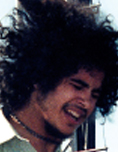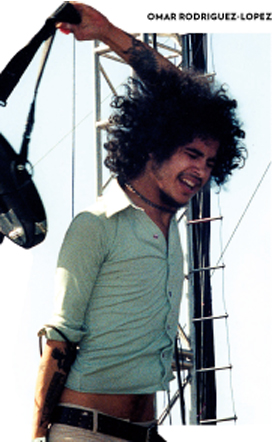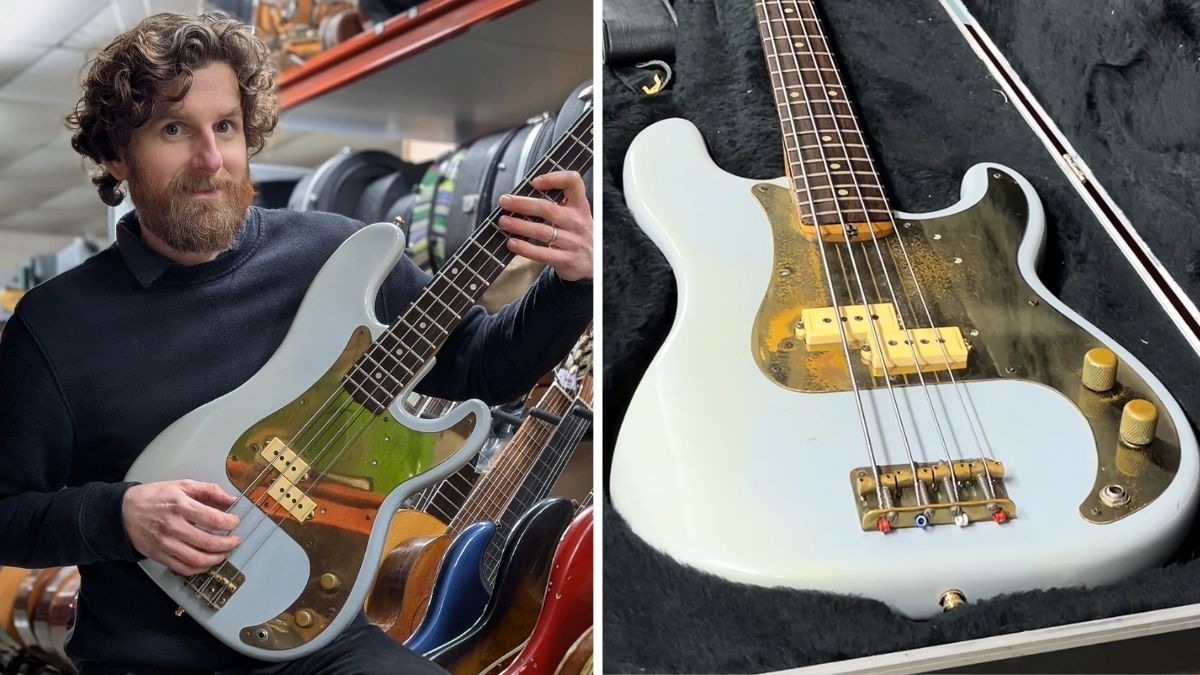The New Guitar Gods: Mars Volta
All the latest guitar news, interviews, lessons, reviews, deals and more, direct to your inbox!
You are now subscribed
Your newsletter sign-up was successful


Originally printed in Guitar World Magazine, November 2006 The Mars Volta's reluctant guitar hero, Omar Rodriguez-Lopez, talks about their new album, Amputechture, and his animosity for his instrument. “I've never considered myself a guitarist, and I’ve never liked the guitar,” says the Mars Volta’s Omar Rodriguez-Lopez. These statements may startle the many Mars Volta fans and Guitar World readers who have taken Rodriguez-Lopez as their guitar hero. The L.A. musician rated highly in a recent GW reader poll, and it may indeed be hard at first glance to perceive his epic freeform guitar solo marathons, some of which stretch to a quarter-hour or more, as the work of a man who dislikes the guitar. But then again, there is an undeniable element of struggle in the Mars Volta’s music: in singer Cedric Bixler-Zavala’s disturbingly hallucinogenic lyrical imagery and Rodriguez’s darkly distressed guitar tones. Like many great players, Rodriguez- Lopez has a complex and problematical relationship with his instrument. “I’ve been angry since the beginning, because I’ve always felt like I just got stuck with the guitar,” he says. “It was the only instrument where I could relate my ideas to other musicians. So I’ve always tried in one way or another to wrestle it, destroy it, make it really ugly by adding effects, or just try to make it sound like anything besides this thing I hate—the guitar!” But on the new Mars Volta album, Amputechture (Universal), Rodriguez-Lopez says he’s begun to make peace with his six-stringed nemesis. “I was feeling more comfortable with it and just wanting to play it as a traditional instrument, to see if I was capable of doing that,” he says. “This record probably has the least amount of effects on the guitar of anything I’ve ever recorded. The instrument is actually recognizable as a guitar. In the past, a lot of people have mistaken much of the guitar work on our albums for synths and keyboards.” He and Bixler-Zavala have also departed from the ambitious concept-album format of the previous Mars Volta disc, Francis the Mute. “The theme this time was not to have one unifying theme, to treat it more as a series of vignettes or episodes,” Rodriguez- Lopez explains. “We really took influence from watching old episodic TV shows like The Twilight Zone, Night Gallery and Twin Peaks. The idea was to have all these different stories on the record that are only tied together by the host, which is us.” Not that the end result could ever be mistaken for anything but the Mars Volta. Amputechture shares with its predecessors the deranged but obsessively detailed inner logic of a vivid nightmare. The title itself suggests an architectural edifice made of severed limbs. As always, Bixler-Zavala’s lyrical preoccupations with guts, worms, surgical mutilation and Catholic iconography find an uncannily sympathetic musical counterpart in the tortured tonal constructs of Rodriguez-Lopez. The duo have been the creative core of the Mars Volta ever since they formed the group in 2001, following the breakup of their prior band, emo faves At the Drive-In. The past few Mars Volta albums have been created principally in Rodriguez- Lopez’s L.A. studio, with additional tracks recorded on a Pro Tools rig he brings on the road with him. The man is almost constantly recording, editing or mixing. “I write all the music,” he says. “I work nonstop. I sleep at my studio. I begin working at 11 a.m. and end at about 3 a.m. I’ll maybe watch a movie, fall asleep and then start again the next day.” On album projects, he works with each band member separately, teaching them their parts and tracking them individually. “The process I’ve used on the last two Mars Volta albums is that everything is tracked out of order and out of sequence. One day I might track everything that’s in one particular key. Another day I might track everything very soft, or everything that’s loud and abrasive. So the players don’t really have a context of what’s coming before and after, or how they’re interacting in the song.”
He likens the process to filmmaking, in which scenes are shot out of sequence and the final creation is in the hands of the director. “Once the players are all done with their parts, I don’t allow anyone to be in or near the studio. So when they do get a copy of the finished record, that’s the first time they get to hear how it all fits together. They are able to hear it almost like a fan does.” While the albums are meticulously arranged and produced, Rodriguez-Lopez calls his guitar soloing “my escape from structure. For all the time I spend with the architecture of the music, the guitar solo is just complete expression. It’s the closest I can get to a self-portrait, or a portrait of where I was at the time.” Perhaps Rodriguez-Lopez’s complicated relationship with the guitar stems from the fact that he’s left handed and has small hands. “I’ve always had a hard time finding old left-handed guitars,” he says. “When I do, I just buy them, and I don’t bring them out on the road because they’re so rare.” Instead, he relies on one guitar that Ibanez made for him years ago when he left At the Drive-In and began the Mars Volta. “I brought them a neck from a cheap pawn shop guitar that I really liked, and we worked on a body shape that I liked and a real simple onepickup/ one-knob, Johnny Thunders–esque kind of design. I’m definitely stupid and simple that way.” In addition, he has a ’74 Gibson SG and an old Seventies Telecaster. “And I use a lot of combo amps when I record—mostly a Vox AC-30 and some really small Supro amps, maybe a Fender Twin here and there, and a couple of times I used a Marshall head. But it’s mostly combo amps.” Asked about his guitar influences, Rodriguez-Lopez promptly names salsa pianist Larry Harlow of the Fania Allstars, who guested on Francis the Mute. The guitarist becomes sheepish when reminded of the obvious stylistic links between his playing and that of Seventies guitar icons like Frank Zappa and Mahavishnu John McLaughlin. “I definitely love those records, too, but I always forget to mention them,” he says, and laughs, “just because my biggest influences come from non-guitarists. Trying to sound like someone like Larry Harlow really helps push me to shape my sound. I’m just fond of music in general. Salsa, dub and dancehall are all huge influences, along with country, folk, pop music and electronic music like Richard James [Aphex Twin] or Roni Size. I love every form of music, with the exception of nu-metal.” Someone who shares his eclectic tastes is John Frusciante of the Red Hot Chili Peppers. A longtime Mars Volta supporter, Frusciante played a prominent guitar role on Amputechture. “John is my closest friend next to Cedric,” says Rodriguez- Lopez. “It’s always fun to go record shopping with John, although we always spend too much. And we really had a fun time making the record. John was like a band member for this record. He came in and was literally the guitar player for the album. I’m just playing all the guitar solos and parts that needed to be doubled. He said he had fun just coming in, playing his parts and being part of an eight-piece band without having to take on all the songwriting and producing roles that he has with the Chili Peppers. John’s a true guitar player. He makes it look so simple. I just spend most of my time wrestling with it.” Although he tends to denigrate himself and the guitar, Rodriguez-Lopez is clearly happy with his Mars Volta work. “When people ask me to describe the music, I never know what to say,” he confesses. “You’re having such fun. It’s hard to describe to people what your fun looks like.”
All the latest guitar news, interviews, lessons, reviews, deals and more, direct to your inbox!
